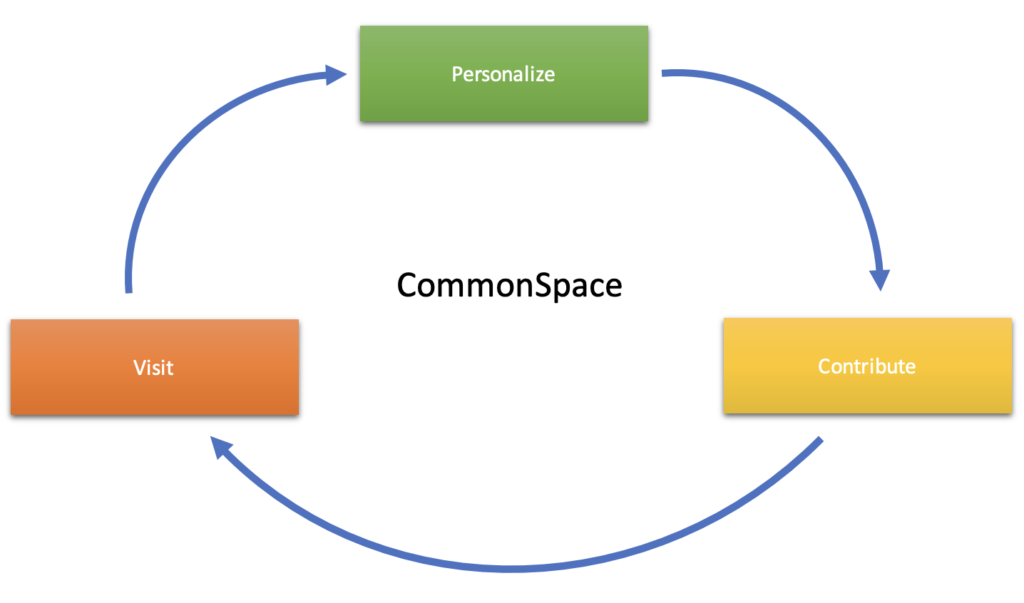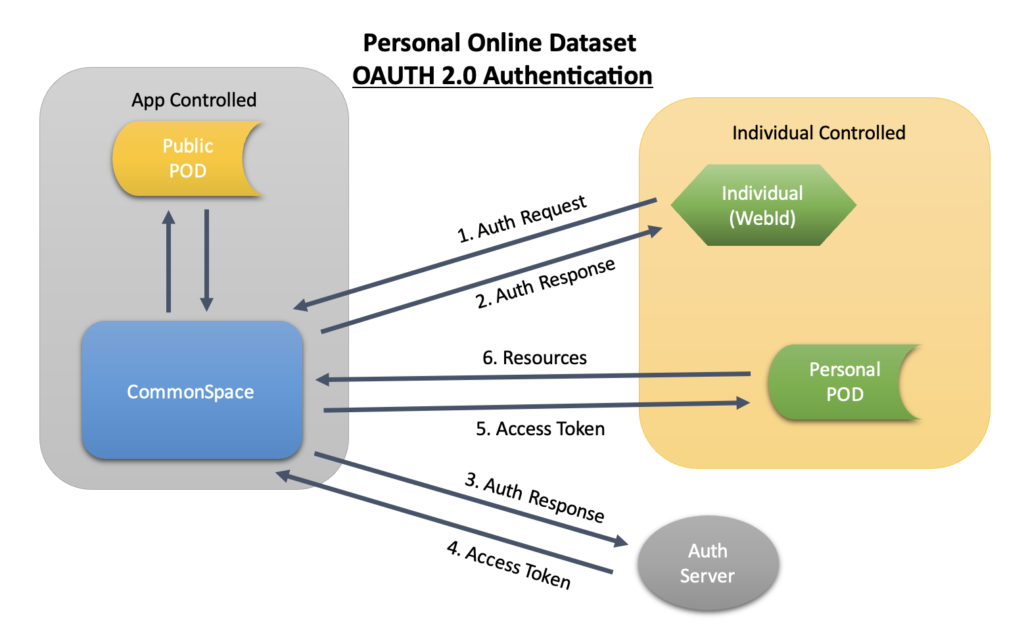CommonSpace is an immersive digital commonplace book that is personal and collaborative! A commonplace book is a collection of knowledge that contains various items to help remember or learn useful concepts.
How is The CommonSpace different?
CommonSpace utilizes the Solid (Social Linked Data), a semantic web specification, to give contributors and personalizers control over their datasets! No more registering with apps. Now the apps register with you! Please see my other post on the importance of personalized datasets.
Visitors, Personalizers and Contributors
As the web regains self sovereignty from the corporate control of big tech, our verbiage will have to adapt to reflect our personal power. So we’ve coined new terms for the typical “user”, which in today’s web seems to hint that the user is being used rather than using an app itself.
Typical “users” have to register with an app and then login to that app with username and password. Worse, they might even need to share more personal (and sellable) information, like a phone number, for the apparent added security of two factor authentication. With Solid, the apps verify their identity with the individual. Rather individuals signing up for an app and claiming space on that app’s database, Solid apps request access to an individual’s personal online datastore (POD) instead.
Visitor = A person accessing the CommonSpace for the first time, or one who doesn’t wish to contribute or personalize. They simply want to immerse themselves in the publicly shared knowledge that others have contributed.
Personalizer = A person who has authorized CommonSpace to access a portion of their POD (personal online data store) and use that portion as their CommonSpace data base.
In a typical application, this data space is controlled by the app creators. With solid, it is controlled by the person, the personalizer, the self-soveriegn individual.
A personalizer, in granting access to their Solid POD, also authenticates their identity with CommonSpace. This establishes trust between both app and individual.
Contributor = A personalizer who chooses to contribute to CommonSpace’s datastore.

The contributor role mimics traditional application architecture, like Instagram or even the Starbucks app. Every app needs a place to store information on the people who wish to have a personalized experience. Traditionally, this data is stored on a central database owned, controlled and maintained by the application developers themselves. This format is outdated and not scalable in the oncoming personal AI era.
In Solid based applications like CommonSpace, a person grants access to their personal online datastore. The individual chooses where they store their online datastore, in the cloud, on a local device or within a local network, and authorizes what apps have access to certain sections of those stores. App authorization also serves as authentication of that person via their WebID, so the app itself can trust the person. A two-way street for once! The person trusts the app, grants them access, and the app trusts the person in return.

People choose what data their apps get to mine! Enshittification be gone! No more users as the product! Now we can capitalize on our data, rather than it (and us) being capitalized upon! No more Gryzzl.
The person trusts the app, grants them access, and the app trusts the person in return.
Purpose Of The CommonSpace
This app is primarily a Solid onboarding tool that incentivizes visitors to create their own Solid storage containers, called PODs (Personal Online Datastores), so they can personalize their CommonSpace experience and contribute to the public knowledge pod if they choose. I use a public pod controlled by CommonSpace here to mimic how most apps work today. But I hope to implement a different architecture soon, as I mention in this essay.
Visit the space > Personalize it > Contribute to the communal space
It is the authors hope that CommonSpace is the first of many applications a visitor uses with their Solid POD! Once a pod is created, it can be used with an Solid based app on the world wide web as a digital autonomy tool.
What is Digital Autonomy?
Autonomy is self-sovereignty. Self-sovereignty is self governance. In the physical world this is control over ourselves and the things we own. In the digital world, this is control over our data. Everything we claim to “own” in the digital realm is simply ones and zeros that make up a digital object. In the real world, everything can be boiled down to cells or atoms. In the digital, it’s ones and zeros. Solid provides opportunity for digital autonomy by giving individuals control over their ones and zeros, their data, their things, their digital selves!
Looking Ahead
CommonSpace is an example of what the web could look like once people and companies (like content creators or small businesses) have their own online datasets that they can control. While this is a playground for Solid understanding right now, I hope to add integration with IPFS so we can understand the benefits of tokenized and/or distributed data. In the future, I see clients like CommonSpace simply concentrating on the USER EXPERIENCE, not the data sources. Whether that experience be an immersive experience, interactive experience with an A.I. agent, or a simple content based website. Every user interface/experience will not worry itself with holding the data. They will no longer be incentivized to do so, or trusted if they require a visitor to store data in a place that individual does not control.
Visit CommonSpace
Love yourself
– Britt
